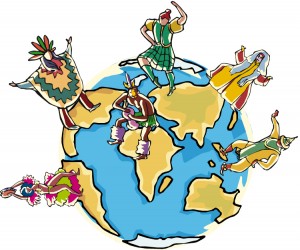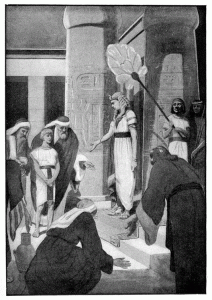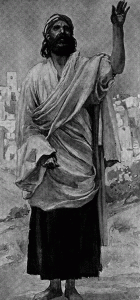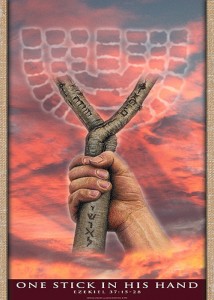The Bible talks about an end times exodus of God’s people that will make the first exodus of the children of Israel from Egypt look small and forgettable. This will be an exodus from enslavement to the Babylon the Great world system and will be the greatest spiritual revival in the history of the world to bring Elohim’s people back to him and back to their promised inheritance in the land of Israel. In this video, learn how this event relates to the second coming of Yeshua the Messiah.
Tag Archives: Ephraim
What Is the Second Exodus & When Does It Occur?
The children of Israel left Egypt on the first day of the Feast of Unleavened Bread, and crossed through the Red Sea on the last or seventh day of this feast. This was the first exodus. But there’s more!
The biblical prophets speak of a greater or second exodus to occur in the last days where YHVH’s people who’ve been scattered throughout the nations of the world will be set free from their spiritual, economic and political enslavement in the nations, which are under the control of Babylon the Great. There is much to learn on this subject, and it’s an important subject to study, since it affects your spiritual destiny.
The following article is a comprehensive analysis of this topic, which explores all the biblical scriptures on the subject of the second exodus. It’s a long one article, but try to stay with it and read it to the end. It will help you to understand end times Bible prophecy in a way that only a privileged and enlightened few do. You have never read anything like this before. It will help you to understand where you personally fit into end times Bible prophecy!
A Look at End-Times Bible Prophecies Relating to the Second Exodus
By Ya’acov Natan Lawrence
The Issue in People’s Hearts
The Bible clearly teaches that the ten tribes of the ancient northern kingdom of Israel (known biblically by various names such as the house of Israel, Samaria or Ephraim) were exiled among the nations of the world because of sin (1). At the same time, the biblical prophets and Jewish sages over the past 2000 years have predicted that in the end times (at the coming of the Messiah), through a series of supernatural events, these tribes will be regathered and return to the land of Israel to be reunited with their Jewish brethren who are descended from the southern kingdom of Judah (2). Furthermore, there is clear biblical and historical evidence that the ten northern tribes of Israel collectively known as Ephraim are largely to be found among the Christian peoples scattered across the earth. I have attempted to prove this point from biblical, linguistic, archeological, historical and rabbinic Jewish sources in a previous work (3)) .
In these last days before Messiah’s second coming, more and more redeemed believers in Yeshua (the Hebrew name for Jesus) are discovering a new-found love for the Jewish people and the land of Israel. At the same time, they are awakening to the need to return to the Hebrew roots of the Christian faith by adhering to a more Torah-centered lifestyle and spiritual walk. It then follows that some are coming to the fundamental truth taught Continue reading
Who Did the Ten Tribes Become According to the Jewish Sages?
Genesis 48:19, Multitude of nations. Here is what the ancient Jewish sages say about this prophetic verse pertaining to the descendants of Ephraim and Manasseh:
- Ibn Ezra: Many nations will descend from him (i.e., the word fullness [Heb. melo], connotes abundance, the phrase meaning: And his seed will become the abundance of the nation [Neter; Karnei Or].) (The ArtScroll Bereishis/Genesis Commentary p. 2121)
- R. Avraham b. HaRambam somewhat similarly: The expression denotes abundant profligacy to a point that they will have to inhabit lands of other nations it is an allusion to Ephraim’s expansive territory (Ibid.).
- Radak: This refers to the Exile when the lands of others will be filled with his scattered descendants … See also Hos 7:8: “Ephraim shall be mingled among the nations. (Ibid.)
- What kind of blessing was this prediction that one day his descendants—the Ten Tribes—would be scattered among the nations? R. Munk explains: while it is true that the dispersion was caused by the unfaithfulness and sinfulness of Ephraim’s descendants (Hos 7:8ff), Jacob’s blessing was not in vain for “they will return to God” and will have their share in the world to come (Sanhedrin 110b). And R. Eliezer adds: “Even the darkness in which the Ten Tribes were lost will one day become as radiant as the day’ (according to the version of Avos d’Rabbi Nosson 36). And in the perspective of history, did not these exiled children of the Patriarchs enlighten the nations among whom they were scattered? They did so by teaching their conquerors the fundamental ideas of the knowledge and love of God, ideals they had never forsaken. Hence they too have a messianic vocation and their Messiah the. … Messiah son of Joseph (Succah 52a), also called Messiah son of Ephraim (Targum Yonasan on Exod 40:11), will play an essential role in humanity’s redemption, for he will be the precursor of the … Messiah Son of David …” (Ibid., pp. 2121–2122).
- Ibn Ezra declares that many nations will descend from Ephraim, Continue reading
Joseph, Ephraim, Manasseh & Benjamin in End Times Prophecy
Here are a few of my thoughts on who Joseph, Ephraim, Manasseh and Benjamin represent in end times Bible prophecy.
In studying the Jewish sages of old, I am amazed at how prescient they were about end time events. They gained this understanding often as they studied the lives of notable biblical characters.The sages had the strong sense that history would repeat itself— often again and again for the people of Elohim. This they observed in the cyclical patterns of Israel’s own history where YHVH gave them the truth, they remained faithful to it for a while, and turned from it, were punished and then returned to Elohim only to have the cycle repeat itself again and again.
As I have studied their method of predicting the future based on past events in Israel’s history, this has led me to some of my own speculations, which I present to you below.
There is much more to learn on this subject and I try to remain teachable.
Joseph, Ephraim and Manasseh Antetypical of Christianity
Joseph’s wife was the daughter of an Egyptian priest. Jospeh married into the religious system of Egypt. He is a picture of Christian church, which has married itself to Babylon by syncretizing itself with certain pagan traditions and belief systems. Joseph is a picture of the end time lukewarm church. Ephraim and Manasseh were products of the union of Joseph (an Israelite) and Potifera (an Egyptian). Though they were Israelite, they were genetically a mixture of both Israelite and Egyptian blood. In fact, they resembled Egypt so much that Jacob, when blessing them, didn’t even recognize who they were. They were strangers to him. Though they were spiritual mulattos, their spiritual destiny was to identify wholly with their Israelite heritage, which would necessitate their renunciation of their Egyptian ties. In the end times, YHVH is calling Christians to renounce the pagan ties they Continue reading
After Two Days (Is That Now?)
Hosea 5:15–6:3, I will go and return to my place. This passage is a clear prophecy concerning the resurrection of the righteous dead of which Messiah Yeshua is the first to raise.
Verse two contains a Hebrew parallelism, which is a Hebraic literary device where the same thought is expressed differently back-to-back. The word revive is the Hebrew word chayah, the basic Hebrew root verb meaning “to live or to have life.” The word raise up is the Hebrew word quwm meaning “to rise, arise, stand, stand up.” According to TWOT, the basic meaning of this word “denotes rising up from a prostrate position (e.g. Josh 3:16).”
YHVH is speaking here in the broader context of this passage concerning his Messianic role as the lion of Judah (Rev 5:5). After presenting himself as such to both houses of Israel (Ephraim [i.e., the Christians] and Judah [i.e., the Jews]) at his first coming, verse 14 states that Messiah would “go away … and none shall rescue him.”
Then in verse 15 we read that, “I [Messiah speaking] will go and return to my place till they [Ephraim and Judah] acknowledge their offense and seek my face ….” (This refers to Yeshua’s absence from the earth between his first and second comings.) What is their offense? Continue reading
Hosea: An Ancient Prophecy That Involves Us
Hosea 2:1–22, Hosea: The Story of YHVH’s Unfailing Love for His People
The prophet Hosea, a native of the northern kingdom of Israel, ministered to that nation (called Ephraim or the house of Israel, as opposed to the southern kingdom, called Judah or the house of Judah) for about 38 years during the middle part of the eighth century b.c. (from about 770–725 b.c.). He lived in the final tragic days of the house of Israel and prophesied that Israel’s enemy, the Assyrians, would be instruments in YHVH’s hands to bring judgment against Israel if that nation did not repent and cease its spiritual harlotry and idolatry. That the book contains references to the kingdom of Judah is probably due to the fact that the northern kingdom fell in 721–722 b.c. while Hosea was still ministering and that he most likely transplanted to Judah where he may have finished writing his book (niv Study Bible, p. 1312).
The theme of the Book of Hosea revolves around the prophet’s personal family life. YHVH’s prophets were often required to act out in their personal life something that would serve as a prophetic allegory of what would happen to the people of Israel if they failed to repent of their sin and return to YHVH. In Hosea’s case, YHVH required him to act out what had already happened to the northern kingdom. Because they had turned from YHVH, their spiritual husband, and taken to consorting with foreign spiritual lovers characterized by their forsaking the Torah, turning to serve pagan gods, and succumbing to heathen religious rituals and lifestyles, YHVH instructed the prophet to marry a harlot. In this way, the family life of Hosea would become a spiritual mirror that could be held up in front of the nation so that it could see itself as YHVH’s saw it. Furthermore, being married to an unfaithful wife gave Hosea direct insight into the emotional turmoil a husband endures when married to an adulterous woman that would provide the passion and impetus when defending YHVH in writing about the spiritual plight of adulterous Israel.
Hosea’s life must have been a sad one, for his adulterous wife bore him three children. From the text, it cannot be determined whether they were his children, or another man’s. Despite this, Hosea accepted his wife and children with an unconditional love representing YHVH’s love for Israel, Continue reading
The Two Sticks Prophecy Yet to Be Fulfilled
Ezekiel 37:14–28, The vision of the two sticks (trees). The second vision Ezekiel records in chapter 37 involves YHVH commanding him to take two sticks (or trees) and writing upon one stick “for Judah and for the children of Israel and his companions [i.e., those who have knit themselves together with or joined to the tribe of Judah],” and upon the other stick, write “for Joseph, the stick of Ephraim, and for all the house of Israel and his companions.” Ezekiel was to told to then join the two sticks together, so that they would become one stick (or tree) in his hand (verses 15–17).
How were these two nations, which separated from each other some three thousand years ago, to be rejoined into one nation? That has been the subject of much debate between both Jewish and Christian commentators for years. Some modern historical revisionists view this prophecy as having been fulfilled when the Jews returned to the land of Israel in the time of Ezra and Nehemiah after their Babylonian captivity ended. But this interpretation leaves some unanswered questions. The book of Ezra, which chronicles the return of a remnant of Jews from Babylon to the land of Israel, lists the numbers and tribes of those who returned. All the tribes listed were originally from Jerusalem and Judah and were from the tribes of Judah and Benjamin (Ezra 2:1; 4:1; 10:9), and there is no mention made that any of the ten northern Israelite tribes joined the Jews in resettling the land of Israel. So far as the returning Jews were concerned, it is likely that they considered their northern brothers lost and assimilated among their Assyrian captors and that only they were left of all the twelve tribes to resettle the Promised Land after their captivity. If this were so, Continue reading





